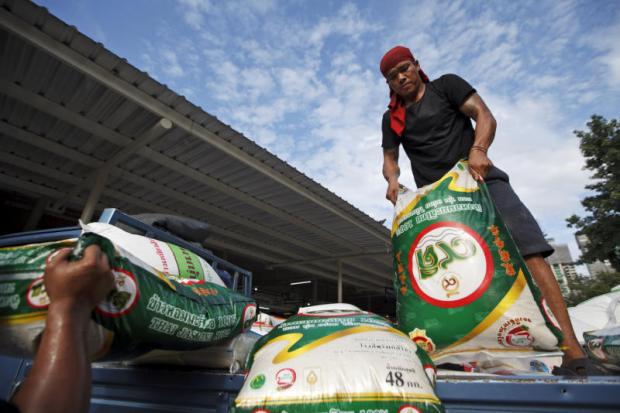
Thai exporters yesterday signed five memorandums of understanding (MoUs) for a combined 11,000 tonnes of rice and 800,000 tonnes of tapioca chips with Hong Kong buyers at a business matching event organised by the Commerce Ministry.
Commerce Minister Apiradi Tantraporn said of the five, CEC International Holding Ltd, which runs 759 supermarkets in Hong Kong, would buy 10,000 tonnes of Thai hom mali rice from Siam Diamond Export Rice Co.
Kui Fat Yuen Ltd would buy 100 tonnes of gaba rice from Bangsue Chia Meng Rice Mill Co.
Dah Chong Hong Ltd, one of Hong Kong's leading hom mali and glutinous rice importers, would buy 600 tonnes of high-value riceberry, while Kwong Sun Hong Ltd is set to buy 400 tonnes of riceberry from Thai Standard Rice Co.
Values of the rice deals were not disclosed.
Yesterday, Fu Lai Chun Group also signed a MoU to buy 800,000 tonnes of tapioca chips from PR Intertrade Ltd for US$156 million (5.5 billion baht).
According to Mrs Apiradi, apart from the five MoUs, the three-day business matching event, which attracted 300 traders from 41 countries and 100 local traders of rice, tapioca and their by-products, is expected to generate 63 billion baht worth of combined purchase orders for related products.
"We hope the event will help rev up the disposal of our farm products in the remaining months of the year, which would help drive up domestic prices accordingly," he said. "We expect rice prices to improve once we are able to export more."
Sanya Kasetchareonkij, managing director of Siam Diamond Export Rice Co, said the prospects of Thai rice exports remain promising thanks to competitive prices, particularly against grain from Vietnam.
He also expects domestic rice prices to recover sometime soon after the government introduced myriad measures to shore up prices and teamed up with the private sector to promote sales.
The cabinet last Tuesday approved a fresh rice subsidy programme worth 18 billion baht for farmers who grow white rice and Pathum Thani fragrant paddy and store it in barns for a designated period of time.
Under the programme, 7,000 baht per tonne will be paid to white rice paddy growers and 7,800 baht to those who grow Pathum Thani fragrant rice.
Growers of both rice varieties will also receive 1,500 baht for storage costs and 2,000 baht for harvesting and quality improvement.
Most of the farmers who grow these two kinds of rice are in the Central Plains.
As for those who do not have barns, the government will encourage growers in the Central Plains to contact agriculture cooperatives in their areas for ways to store rice.
Unlike farmers in the Northeast, most of the rice farmers in the Central Plains have no barns for storing rice because they usually sell it immediately after harvest.
The government earlier launched a subsidy scheme worth more than 20 billion baht to help hom mali farmers suffering from falling rice prices in the North and Northeast, sparking anger among farmers from other parts of the country who grow different strains and want equal treatment.
For the first nine months, Thailand has shipped a total of 6.85 million tonnes, up 3.7% from the same period last year, worth $3.08 billion, down 4.4%. Key markets include Benin, China, the US, South Africa and Ivory Coast.
